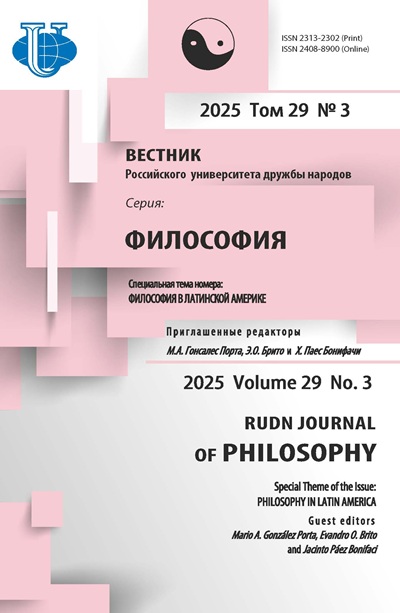Философский вклад Веданта Дешики в развитие доктрин вишишта-адвайта-веданты
- Авторы: Сафина Н.А.1
-
Учреждения:
- Российский университет дружбы народов
- Выпуск: Том 22, № 1 (2018)
- Страницы: 39-54
- Раздел: ИСТОРИЯ ИНДИЙСКОЙ ФИЛОСОФИИ
- URL: https://journals.rudn.ru/philosophy/article/view/18140
- DOI: https://doi.org/10.22363/2313-2302-2018-22-1-39-54
- ID: 18140
Цитировать
Полный текст
Аннотация
Венкатанатха, известный также как Веданта Дешика, является одной из наиболее значимых фигур индийской философии XIII-XIV вв. Его вклад в вишишта-адвайта-веданту позволил окончательно закрепить данную систему как систему философии. Дешика обосновал ее доктрины и защитил от нападок со стороны представителей других философских учений, в частности, адвайта-веданты Шанкары. До появления работ данного мыслителя, которых на сегодняшний день насчитывается около 120-и, последователи вишишта-адвайты Рамануджи уделяли внимание, в основном, лишь теологическим аспектам учения. В данной статье впервые представлены основные положения философского учения Венкатанатхи и проанализирован его вклад в развитие вишишта-адавайта-веданты. Выявлены основные задачи и проблемы, которые решаются в работах данного философа, рассмотрены три важнейшие онтологические концепции: теория субстанции и атрибута, теория отношения и теория причины-следствия. Последовательно рассмотрены шесть видов субстанции (Бог или Ишвара (īśvara), индивидуальная душа или джива (jīva), знание или джняна (jñāna), трансцендентальное вещество нитья-вибхути (nitya-vibhūti), время (kāla) и материя или пракрити (prakṛti)) и их теории, их деление на сознающие и не-сознающие, материальные и нематериальные. Особо рассмотрена теория познания, определены сущность знания и его функциональные характеристики, а также вопрос достоверного познания.
Ключевые слова
Об авторах
Наталья Алексеевна Сафина
Российский университет дружбы народов
Автор, ответственный за переписку.
Email: videhidevi@gmail.com
младший научный сотрудник УНИП
ул. Миклухо-Маклая, 6, Москва, Россия, 117198Список литературы
- Freschi E. Free Will in Viśiṣṭādvaita Vedānta: Rāmānuja, Sudarśana Sūri and Veṅkaṭanātha // Religion Compass. 2015. Vol. 9(9). P. 287-296. doi: 10.1111/rec3.12163.
- Freschi E. Veṅkaṭanātha’s Engagement with Buddhist Opponents in the Buddhist Texts He Reused // Buddhist Studies Review. 2016. Vol. 33(1-2). P. 65-99. doi: 10.1558/bsrv.31642.
- Oberhammer G. Materialien zur Geschichte der Rāmānuja-Schule VIII. Zur Eschatologie der Rāmānuja-Schule vor Veṅkaṭanātha. Wien: Verlag der Österreichischen Akademie der Wissenschaften, 2006.
- Oberhammer G. Materialien zur Geschichte der Rāmānuja-Schule VII. Zur spirituellen Praxis des Zufluchtnehmens bei Gott (śaraṇāgatiḥ) vor Veṅkaṭanātha. Wien: Verlag der Öster-reichischen Akademie der Wissenschaften, 2004.
- Oberhammer G. Materialien zur Geschichte der Rāmānuja-Schule VI. Die Lehre von der Göttin vor Veṅkaṭanātha. Wien: Verlag der Österreichischen Akademie der Wissen-schaften, 2002.
- Schmücker M. The vyūha as the “State of the Lord” (bhagavadavasthā). Vedāntic Interpretation of Pāñcarātra Doctrines according to Veṅkaṭanātha // Oberhammer G., Marion Rastelli, editors. Studies in Hinduism IV. On the Mutual Influences and Relationship of Viśiṣṭādvaita Vedānta and Pāñcarātra. Wien: Verlag der Österreichischen Akademie der Wissenschaften, 2007. p. 89-106.
- Schmücker M. Advaitic Reasoning of Undertaking (ārambha) the Brahmavicāraśāstra and the Counter-argument in Veṅkaṭanātha’s Śatadūṣaṇī // Edwin Gerow, Walter Slaje, editors. Śāstrārambha. Inquiries into the Preamble in Sanskrit. Wiesbaden: Harrassowitz, 2008. p. 131-147.
- Mumme P.Y. The Śrī Vaiṣṇava Theological Dispute: Maṇavāḷamāmuni and Vedānta Deśika. Madras: New Era Publications, 1988.
- Mumme P.Y. Pancaratra Texts in the Tenkalai-Vatakalai Dispute // Oberhammer G., Marion Rastelli., editors. Studies in Hinduism IV. On the Mutual Influences and Relationship of Viśiṣṭādvaita Vedānta and Pāñcarātra. Wien: Verlag der Österreichischen Akademie der Wissenschaften, 2007. p. 107-123.
- Сафина Н.А. Историографический обзор философско-поэтического наследия Веданта Дешики (Венкатанатхи) // Вестник РУДН. Серия: Философия. 2016. № 4. C. 145-153.
- Freschi E. Veṅkaṭanātha [Internet]. Internet Encyclopedia of Philosophy (IEP). 2016 [дата обращения: 10.01.2018]. Доступ по ссылке: http://www.iep.utm.edu/venkatan/.
- Шохин В.К. Альвары // Степанянц М.Т. отв. ред. Индийская философия: энциклопедия. М.: Восточная литература, 2009. C. 67-68.
- Srinivasa Chari S.M. Vedānta Deśika. The Poet-Dealecrician of Viśiṣṭādvaita School // Balasubramanian R., editor. Life, Thought and Culture in India (AD 300-1100). Vol. 2, Part 3: Theistic Vedanta. History of Science, Philosophy and Culture in Indian Civilization. New Delhi: Centre for Studies in Civilizations, 2008. p. 133-167.
- Шохин В.К. Лунный свет санкхьи: Ишваракришна, Гаудапада, Вачаспати Мишра. М.: Ладомир, 1995.
- Vīrarāghavācārya T. Nyāya Siddhāñjana by Vedānta Deśika with two old commentaries [Saralaviśadavyākhyā by Śrīraṅgarāmānujasvāmi and Ratnapeṭikā by Śrīkāñcī Kṛṣṇatātayārya, inc. a Ṭippaṇa by the editor]. Madras: Ubhayavedāntagranthamālā, 1976.
- Toshihiro Mikami. Nyāyasiddhāñjana of Vedānta Deśika. An annotated Translation. PhD thesis [Internet]. Tokyo: University of Tokyo, n.y. [дата обращения: 10.01.2018]. Доступ по ссылке: http://homepage3.nifty.com/indology/NyayaSiddhanjana.pdf.
- Псху Р.В. «Ведартхасамграха» Рамануджи и становление вишишта-адвайта-веданты. М.: РУДН, 2007.
- Шохин В.К. Сарвастивада // Степанянц М.Т. отв. ред. Философия буддизма: энциклопедия. М.: Восточная литература, 2011. C. 612-617.
- Мюллер М. Шесть систем индийской философии. М.: Искусство, 1995.
- Radhakrishnan S. Indian Philosophy. Vol. II. New York: The Macmillan Company, 2009.
- Чаттерджи С., Датта Д. Индийская философия. М.: Академический проект; Гаудеамус, 2013.
- Исаева Н.В. Бхеда-абхеда [Internet]. Электронная библиотека ИФ РАН. Новая философская энциклопедия. [дата обращения: 10.01.2018]. Доступ по ссылке: https://iphlib.ru/ greenstone3/library/collection/newphilenc/document/HASH010f9bd0f284b3be27713f0f.
- Чхандогья-упанишада // Сыркин А.Я., пер. с санскр., исслед., коммент. и приложение. Упанишады. М.: Восточная литература, 2000. С. 279-372.
- Шветашватара-упанишада // Сыркин А.Я., пер. с санскр., исслед., коммент. и приложение. Упанишады. М.: Восточная литература, 2000. С. 563-578.
- Брахмабинду-упанишада // Сыркин А.Я., пер. с санскр., исслед., коммент. и приложение. Упанишады. М.: Восточная литература, 2000. С. 659-662.
- Псху Р.В. «Ведартхасамграха» Рамануджи: полемика вишишта-адвайта веданты с бхеда-абхеда-вадой // Вестник РУДН. Серия: Философия. 2006. № 2 (12). С. 105-116.
- Исаева Н.В. Вивартавада // Степанянц М.Т. отв. ред. Индийская философия: энциклопедия. М.: Восточная литература, 2009. С. 265-266.
- Singh Satyavrata. Vedanta Desika. His life, works, philosophy. Varanasi: Chowkhamba Sanskrit series studies vol. V, 1958.
Дополнительные файлы















